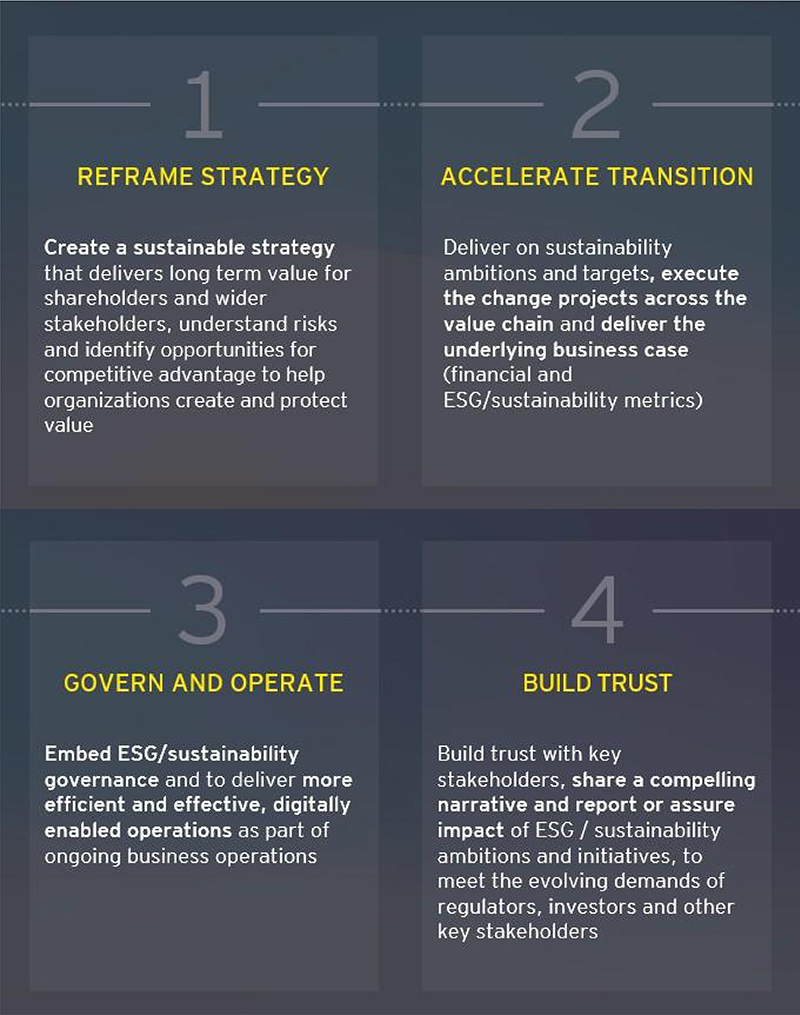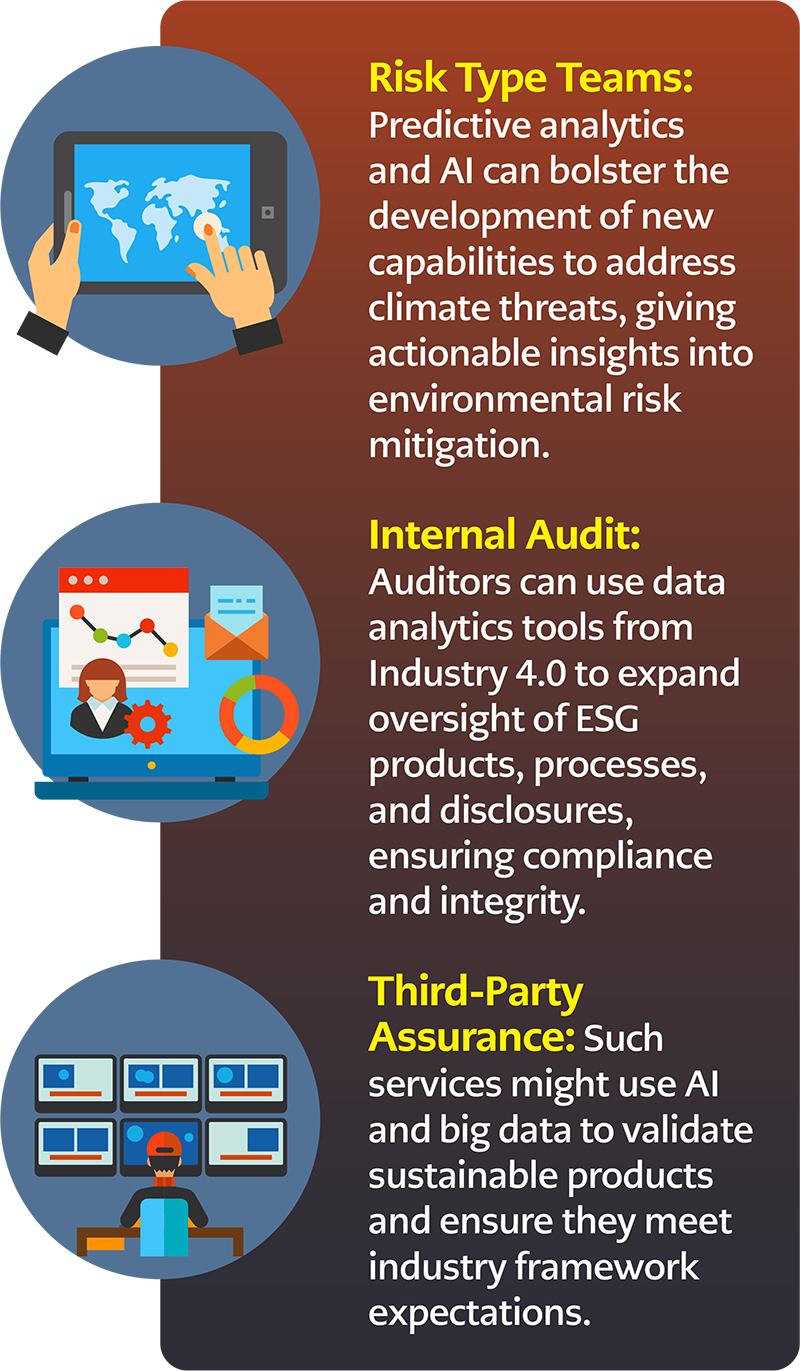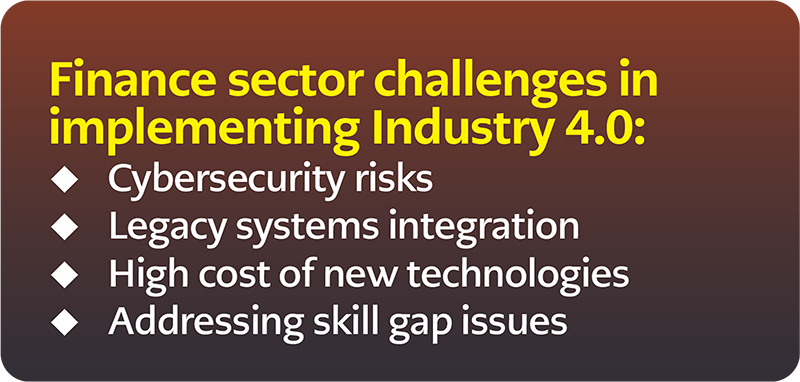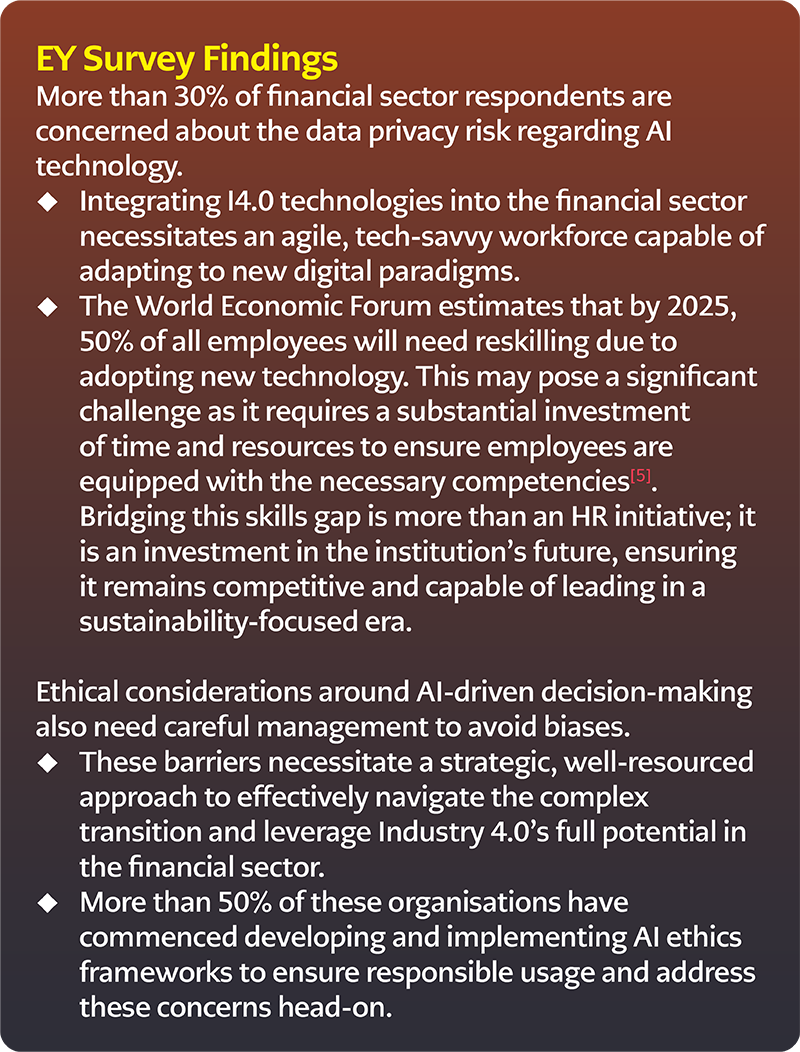Embracing Sustainability: Financial Industry Meets Industry 4.0 (I4.0)
To foster an eco-conscious future for the planet, the financial industry braces through a pivotal transition that includes implementing the latest technology to adopt sustainability


The financial industry (banking, investments and insurance) increasingly aligns with sustainability, directing capital towards environmentally responsible endeavours, notably within the manufacturing sector. As customers and regulations demand greener practices, financial institutions must leverage their assets to fund ventures promoting long-term environmental benefits. Green bonds are at the forefront, providing capital for manufacturers to invest in clean technologies and sustainable processes.
Integrating Environmental, Social, and Governance (ESG) criteria further guides investments towards firms with commendable sustainability records, encouraging cleaner manufacturing. Impact investing is also gaining ground, blending financial returns with tangible social and environmental benefits by supporting sustainable innovations in manufacturing.1
This sustainability trend in finance reflects an imperative shift towards practices that ensure economic activities contribute positively to the planet's health. Transition is pivotal, using its financial clout to incentivise the manufacturing industry to adopt sustainability as a core aspect of its operations, thereby fostering an eco-conscious future for the planet.

As we pivot to the next section, we will explore the paramount role of I4.0, which takes this sustainable momentum further by embedding advanced digital technologies within the fabric of financial operations based on a proprietary Ernst & Young (EY) framework. EY provides the tools to measure, manage, and report on sustainability goals in real time, offering a more precise and actionable approach to green finance. Thus, the synergy between Industry 4.0 and sustainability initiatives represents the next frontier for financial institutions seeking to harmonise economic growth with ecological stewardship.
Embracing Industry Evolution
The journey toward assessing I4.0's impact on sustainability within the financial industry begins with the legacy of the Third Industrial Revolution, which introduced automation and the beginnings of the digital era in finance. This revolution transformed traditional banking and investment practices, offering digital solutions that became commonplace by the turn of the century. I4.0 takes this digitalisation a step further in financial services, harnessing advanced technologies such as the Internet of Things (IoT), Artificial Intelligence (AI), and cloud computing to forge highly interconnected and data-driven financial ecosystems.2 These advancements are reshaping the industry not solely for enhanced productivity and performance but also with an emphasis on advancing sustainable economic growth. The financial sector's role in promoting sustainability has consequently expanded, with I4.0 providing the tools to invest in and support green initiatives and eco-friendly developments on a scale previously unattainable.
Reframe Strategy and Accelerate Transition
By leveraging big data analytics and AI, the financial industry can dissect vast datasets to unearth environmental risks and investable opportunities in green production technologies. This depth of insight enables the strategic allocation of funds to areas with the highest potential for environmental impact, such as renewable energy projects or sustainable manufacturing processes. AI algorithms assess global sustainability trends to forecast market shifts, identifying sectors and companies poised for growth due to sustainable practices. The predictive capabilities of AI can create models that simulate various scenarios with different ESG asset combinations to find the optimal balance of risk and return tailored to meet individual investor sustainability profiles. The AI in Financial Services global study — jointly conducted by the Cambridge Centre for Alternative Finance at the University of Cambridge Judge Business School and the World Economic Forum and co-sponsored by Ernst & Young LLP – shows that firms expect AI to become most widely used in the latter field, with 95% expecting to be harnessing AI capabilities in the generation of new revenue potential within two years.
Additionally, IoT can play a decisive role in developing new financing models based on real-time sustainability metrics. For instance, pay-per-use financing for energy-efficient machinery incentivises investment in greener production while providing measurable results for lenders and borrowers. By adopting I4.0 technologies in their strategy reformation process, financial institutions can influence and actively drive the transition towards greener production, aligning profit motives with planetary needs and setting a new standard in sustainable finance.
Govern and Operate
Governance and operation of sustainability initiatives are streamlined through enhanced data analytics and real-time monitoring capabilities. Industry 4.0 technologies offer financial services the tools to implement robust governance structures, ensuring that sustainability policies are effectively integrated into all aspects of operations. Through advanced analytics, institutions can continuously monitor compliance and manage sustainability performance, and adjusting operational practices to meet governance standards.3


A use case example involves the Credit and Operational Risk Teams adopting AI and machine learning to create high-precision models that can predict the financial impact of climate change on the loan portfolio. Integrating these models into their risk assessment frameworks, the FI can better evaluate the environmental creditworthiness of borrowers, allowing for more informed lending decisions that consider the potential risks of climate volatility. This proactive approach aligns lending practices with the company's Net Zero commitments and anticipates the financial implications of a changing climate, ensuring a more sustainably-focused and resilient operation.
Build Trust
Building trust with stakeholders relies on transparency and demonstrating genuine commitment to sustainability. Blockchain technology can create immutable ledgers of ESG-related transactions and investments. This assures stakeholders that the efforts reported by the financial institution are accurate and unalterable, providing a high level of transparency.4 AI-driven analytics provide in-depth reporting capabilities that offer insights into sustainability efforts and outcomes, demonstrating accountability and building trust with external parties. IoT devices can monitor and report on the real-time environmental impact of financed projects. Such granular tracking reassures stakeholders that financial resources contribute to tangible sustainability outcomes.


By tapping into Industry 4.0, financial services are not just automating and optimising their operations but are also embedding sustainability into their DNA. Technologies like AI, blockchain, and IoT equip these institutions to reshape strategies for a sustainable future, transition more quickly to greener practices, govern their progress accurately, and build trust through demonstrated and verifiable actions, aligning with EY's sustainability framework.
References:
- Broom, D. (no date) Explainer: What is Sustainable Finance?, World Economic Forum. Available at: https://www.weforum.org/agenda/2022/01/what-is-sustainable-finance/ (Accessed: 26 April 2024).
- Machkour, B., & Abriane, A. (2020). Industry 4.0 and its implications for the financial sector. Procedia Computer Science, 177, 496–502. https://doi.org/10.1016/j.procs.2020.10.068
- Turek, J., Ocicka, B., Rogowski, W., & Jefma?ski, B. (2023). The role of Industry 4.0 Technologies in driving the financial importance of sustainability Risk Management. Equilibrium. Quarterly Journal of Economics and Economic Policy, 18(4), 1009–1044. https://doi.org/10.24136/eq.2023.032
- L. Liu, Z. Ma, Y. Zhou et al., Trust in ESG Reporting: The Intelligent Veri-Green Solution for Incentivized Verification, Blockchain: Research and Applications, 100189, doi: https://doi.org/10.1016/j.bcra.2024.100189
- Whiting, K. (2020) These are the top 10 job skills of tomorrow – and how long it takes to learn them, World Economic Forum. Available at: https://www.weforum.org/agenda/2020/10/top-10-work-skills-of-tomorrow-how-long-it-takes-to-learn-them/
Ling Kay Yeow, Malaysia Financial Services Consulting Leader, Ernst & Young Consulting. Kay Yeow has 24 years of experience in information technology and financial services. He has been involved in multiple financial institution transformation programmes and is an expert in core system implementation, digital transformation, programme management, investment systems, and data management and governance.






